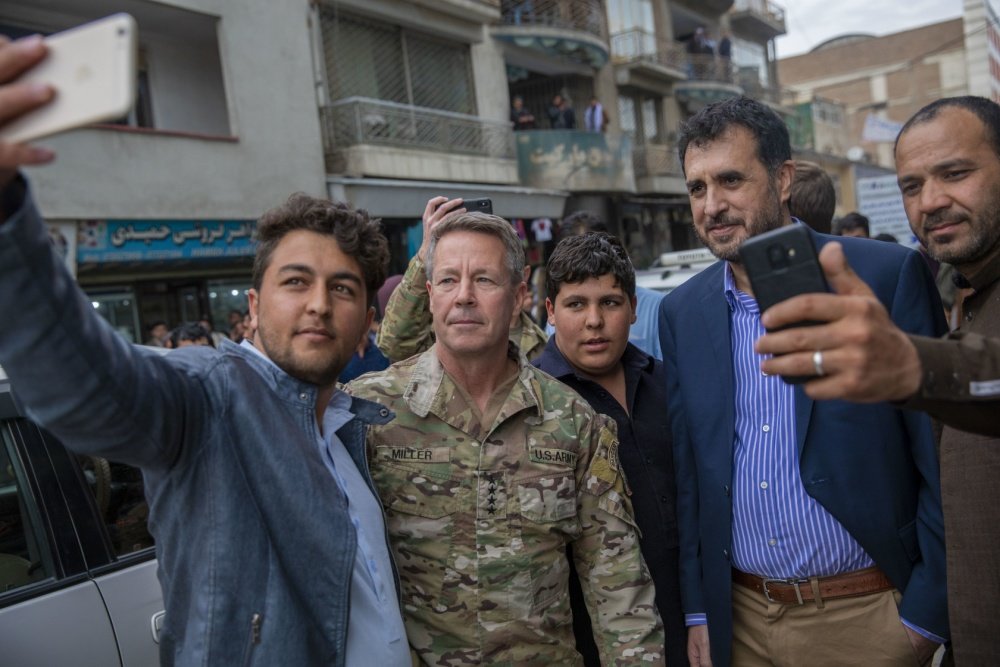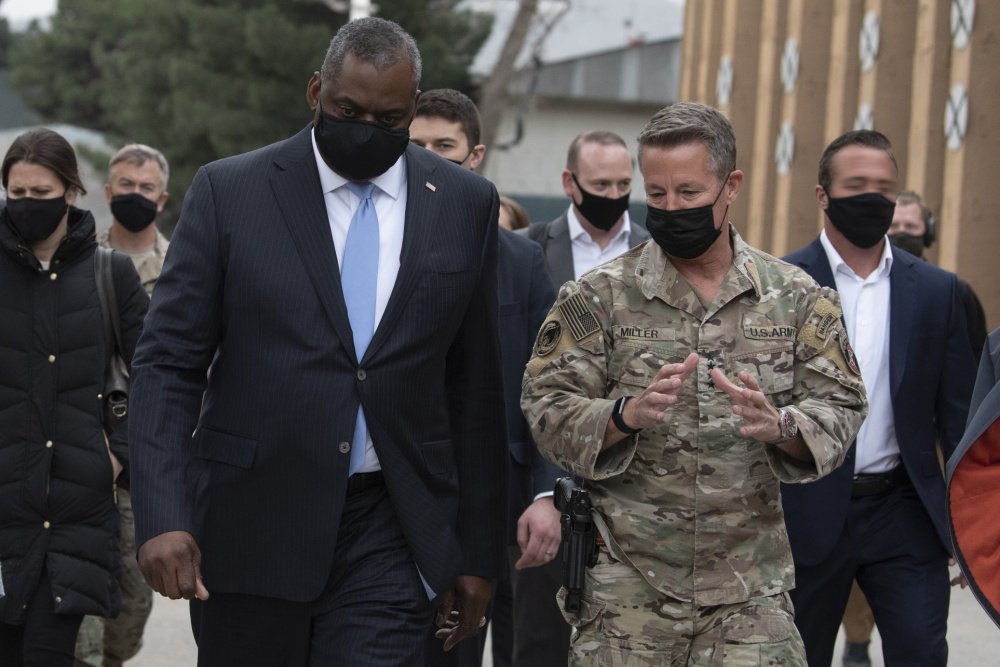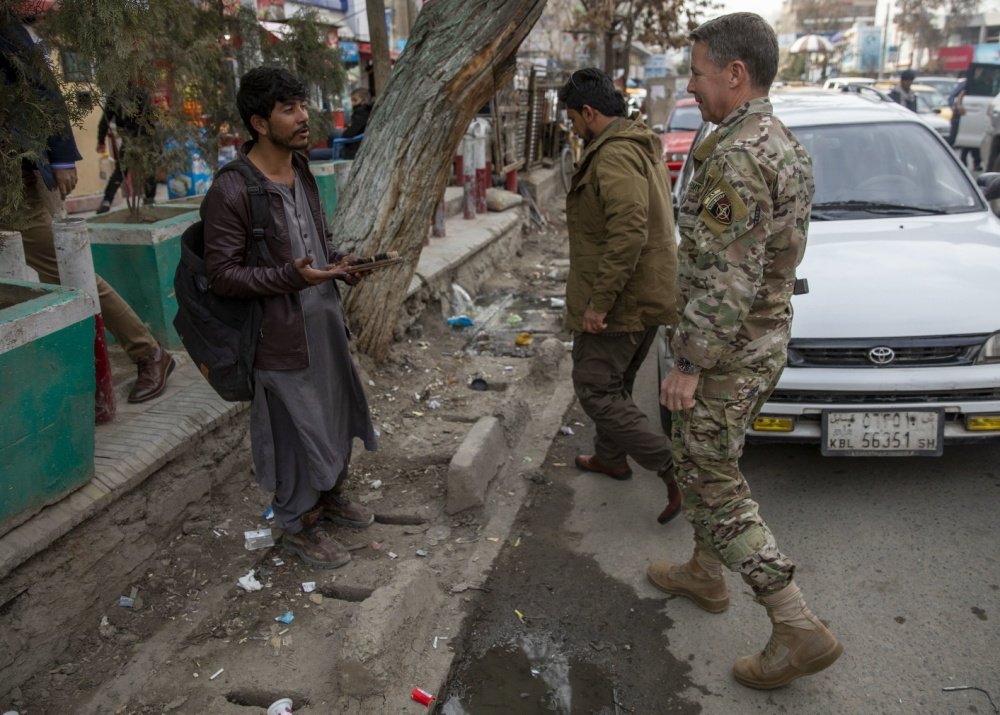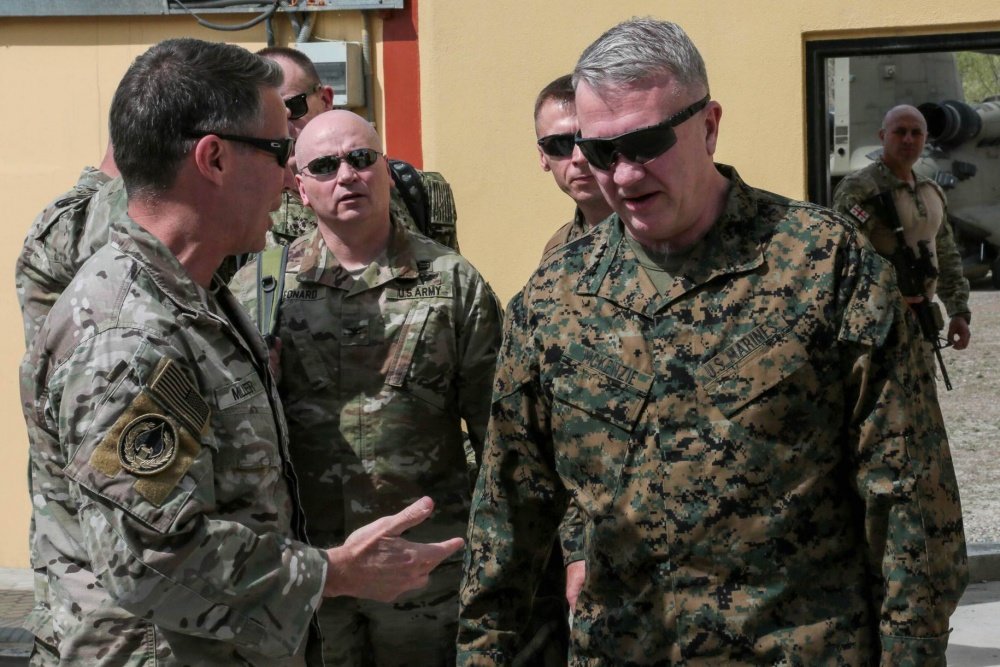As Taliban Gains Continue, Top US Commander in Afghanistan Hangs Up His Spurs

Resolute Support Commander US Army Gen. Austin Scott Miller and Afghan Minister of Defense Asadullah Khalid take selfies with residents in downtown Kabul, Afghanistan, Feb. 26, 2020, during the seven-day reduction in violence that preceded the signing of the US-Taliban Peace Agreement in Kabul. US Army Reserve photo by Spc. Jeffery J. Harris, courtesy of DVIDS.
With the Taliban making territorial gains across Afghanistan, America’s top general in Afghanistan resigned his post Monday, marking a key milestone in the incremental wind-down of the longest war in US history.
For nearly three years, Army Gen. Austin Scott Miller has overseen the US mission in Afghanistan. A former commander of the Army’s most elite Special Forces unit, Miller has also been at the helm while US forces have exited the 20-year-long military campaign.
During a ceremony Monday in Kabul, Miller handed over command to Marine Corps Gen. Kenneth McKenzie, the leader of US Central Command. “The people of Afghanistan will be in my heart and on my mind for the rest of my life,” Miller reportedly said during the ceremony.
The end-stage of America’s withdrawal from Afghanistan comes as Taliban forces make sweeping gains across the embattled country. The Associated Press reported Monday that the militants currently controlled “more than one-third of Afghanistan’s 421 districts and district centers.”
In June, Miller warned that the Taliban’s recent territorial advances could spark a civil war.
“A civil war is certainly a path that can be visualized if this continues on the trajectory it’s on right now, that should be of concern to the world,” Miller said, according to an AP report.

Upon taking command Monday, McKenzie said Miller had done “an exceptional job” at his post. Speaking to his Afghan counterparts in attendance, McKenzie reportedly added, “You can count on our support in the dangerous and difficult days ahead.”
President Joe Biden said Thursday that the US was on track to withdraw its forces by Aug. 31, ahead of the previously announced Sept. 11 deadline.
“We did not go to Afghanistan to nation-build,” Biden said during remarks at the White House. “It’s the right and the responsibility of the Afghan people alone to decide their future and how they want to run their country.”
During McKenzie’s remarks in Kabul on Monday, he suggested that US airstrikes would continue in Afghanistan after Aug. 31, but only against “al Qaeda and ISIS targets” — not against the Taliban.
Battlefield momentum currently belongs to the Taliban. According to regional news reports, about two-thirds of Tajikistan’s roughly 850-mile-long border with Afghanistan is currently under Taliban control. The Taliban’s recent advances have reportedly been accomplished with help from al Qaeda — the terrorist group responsible for the Sept. 11, 2001, terror attacks — as well as tacit assistance from Pakistan and Iran.

According to a recent article from the Long War Journal: “The Taliban has not planned and executed this operation without help. Pakistan remains the Taliban’s primary backer and primary safe haven. Iran has helped the Taliban to a lesser extent. Al Qaeda, which was never defeated in Afghanistan, has also played a key role in the Taliban’s success.”
Russia, too, has signaled its strategic conclusion that the Taliban will likely seize power after the American withdrawal.
“I believe Russia is playing a preemptive long game regarding the Taliban and Afghanistan […] They believe the central Afghan government will eventually fail, accelerated by the ongoing US-allied departure,” said Peter Zwack, a retired US Army brigadier general who serves as the senior Russia and Eurasia fellow at the Institute for National Strategic Studies at the National Defense University.
“Keeping a pragmatic link with the Taliban allows [Russia] to retain a modicum of influence with who they see as the likely inheritors of Afghanistan,” Zwack told Coffee or Die Magazine.
The US originally went to war in Afghanistan with the goals of toppling the Taliban regime and bringing Usama Bin Laden and al Qaeda to justice for the Sept. 11, 2001, attacks. Those objectives morphed over the intervening decades into a counterinsurgency campaign against the Taliban and a broader democracy-building exercise.

The US officially ended its combat mission in Afghanistan in 2014, shifting to a so-called advise-and-assist operation that left Afghans to bear the brunt of fighting the Taliban. The move led to a sharp drop in American casualties.
The Taliban’s recent military gains, in tandem with the militants’ cooperation with al Qaeda, have led some lawmakers and defense officials to worry that Afghanistan could once again become a safe haven for terrorist groups with designs on attacking the US homeland.
Some experts warn that the imminent US departure has set the stage for a power vacuum in the Central Asian region that America’s adversaries will seek to fill. Russia and Iran have both interceded in Afghan peace negotiations. China, too, shares a border with Afghanistan and has economic and security interests in the country.
“Russia and Iran would have in common is to deter any further growth of any radical, transnational Sunni extremism,” Zwack said, adding: “Also, how resource-obsessed China, which also worries about Sunni extremism, manages all this bears watch, with tendrils of the [Belt and Road Initiative] growingly running through the region.”
Read Next: Experts Challenge Biden’s Afghanistan Withdrawal Prediction

BRCC and Bad Moon Print Press team up for an exclusive, limited-edition T-shirt design!
BRCC partners with Team Room Design for an exclusive T-shirt release!
Thirty Seconds Out has partnered with BRCC for an exclusive shirt design invoking the God of Winter.
Lucas O'Hara of Grizzly Forge has teamed up with BRCC for a badass, exclusive Shirt Club T-shirt design featuring his most popular knife and tiomahawk.
Coffee or Die sits down with one of the graphic designers behind Black Rifle Coffee's signature look and vibe.
Biden will award the Medal of Honor to a Vietnam War Army helicopter pilot who risked his life to save a reconnaissance team from almost certain death.
Ever wonder how much Jack Mandaville would f*ck sh*t up if he went back in time? The American Revolution didn't even see him coming.
A nearly 200-year-old West Point time capsule that at first appeared to yield little more than dust contains hidden treasure, the US Military Academy said.












